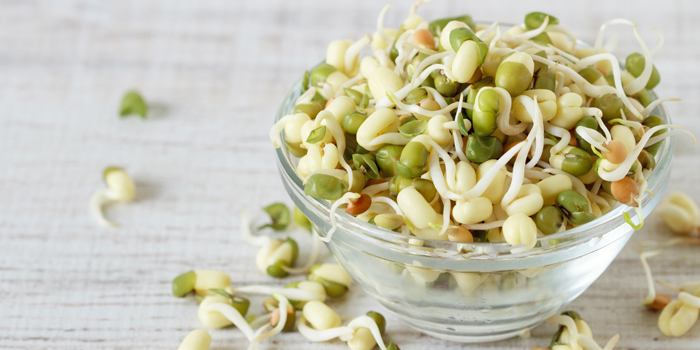Sprouting Goodness

Beans, seeds and wholegrains are all excellent foods in their own right. However, sprouting them hugely increases their nutrient content and bio-availability. As well as having many health promoting properties sprouts are incredibly versatile. They work well in salads, sandwiches and wraps and can add texture, flavour and nutrients to cooked foods. Spring and summer are great times to start sprouting so to motivate you here are just a few of the many benefits of including sprouts in your diet, followed by a recipe for a superfood salad.
Sprouts and Cancer
There is much evidence to suggest that broccoli and broccoli sprouts have anti cancer properties. They contain sulforaphane, which is derived from the glucosinolate in broccoli (1). Sulforaphane has been found to target the most malignant cancer stem cells which are not affected by conventional cancer treatments (2). Mung bean sprouts have also been shown to have potent anticancer properties (3).
Sprouts and Helicobacter Pylori
Helicobacter pylori is the leading cause of stomach ulcers and is associated with an increased risk of stomach cancer. Broccoli sprouts have been shown to reduce the inflammation associated with H.pylori and may also help to reduce the risk of stomach cancer (4), making them a good way of either suppressing or modulating the disease-associated footprints of H. pylori infection (5).
Sprouts and Type 2 Diabetes
The complications of diabetes can be debilitating and life threatening. However, eating broccoli sprouts with a high sulforaphane content has been shown to reduce oxidative stress, lipid peroxidation, triglycerides, oxidized LDL cholesterol, insulin and C-reactive protein in type 2 diabetics all of which can help to reduce the complications of the disease (6,7).
Sprouts and Antioxidants
Increasing antioxidant intake is one of the keys to maintaining health. Sprouting seeds such as sunflower, radish, broccoli and mung beans increases their antioxidant content including total phenolic and flavanoid levels (8,9). After 8 days of germination the vitamin C content in mung beans is almost 24 times higher than their initial concentration (10).
How to Sprout
Put the beans or seeds into a bowl, pan or sprouting jar and cover with plenty of water. Soak for 12 hours or more until the seeds or beans have swollen up. In warm conditions it’s a good idea to change the soak water after a few hours. Rinse well and leave the seeds to drain in a sieve or colander over a bowl or in an upturned sprouting jar. Rinse morning and evening until they start to sprout. They can be eaten as soon as sprouts appear but can also be left to sprout for a few days. The sprouts can be stored, covered with a lid, in the fridge. Rinse well before using. Sprouts can be eaten raw in salads or added to stews, casseroles and stir fries towards the end of cooking. They can also be sprinkled onto soup as a healthy alternative to croutons.
Here’s a recipe to get you started:
Super Sprout Salad
1 cup of buckwheat sprouts
1 cup of lentil sprouts
1 cup of mung bean sprouts
1 cup of alfalfa sprouts
1 cup of sunflower sprouts
2 beef tomatoes, chopped
1 avocado, peeled and cut into small chunks
2 tbsp coriander, chopped
2 tbsp lemon juice
6 tbsp olive oil
2 tsp tamari soy sauce
Salt and pepper
- Combine all the sprouts, tomatoes, avocado and coriander in a bowl.
- Mix together the lemon juice, olive oil and tamari and pour over the salad. Stir well to combine the ingredients. Season with salt and pepper according to taste and stir again.
References
- 1. Future Oncol. 2013 Aug;9(8):1097-103. doi: 10.2217/fon.13.108. Targeting cancer stem cells with sulforaphane, a dietary component from broccoli and broccoli sprouts. Li Y, Zhang T.
- 2. Wien Med Wochenschr. 2013 Feb;163(3-4):80-8. doi: 10.1007/s10354-012-0163-3. Epub 2012 Dec 7. Sulforaphane and related mustard oils in focus of cancer prevention and therapy. Herr I, Lozanovski V, Houben P et al.
- 3. BMC Comp Altern Med. 2012 Nov 5;12:208. Novel molecular, cytotoxical, and immunological study on promising and selective anticancer activity of mung bean sprouts. Hafidh RR, Abdulamir AS, Bakar FA et al.
- 4. Phytother Res. 2012 Nov;26(11):1620-5. Using food to reduce H. pylori-associated inflammation. Keenan JI, Salm N, Wallace AG, Hampton MB.
- 5. J Dig Dis. 2008 Aug;9(3):129-39. Phytoceuticals: mighty but ignored weapons against Helicobacter pylori infection. Lee SY, Shin YW, Hahm KB.
- 6. J Med Food. 2013 May;16(5):375-82. Potential efficacy of broccoli sprouts as a unique supplement for management of type 2 diabetes and its complications. Bahadoran Z, Mirmiran P, Azizi F.
- 7. Int J Food Sci Nutr. 2012 Nov;63(7):767-71. Effect of broccoli sprouts on insulin resistance in type 2 diabetic patients: a randomized double-blind clinical trial. Bahadoran Z, Tohidi M, Nazeri P, Mehran M et al.
- 8. J Sci Food Agric. 2013 Nov 6. Metabolomic analysis of the polyphenols in germinating mung beans (Vigna radiata) seeds and sprouts. Tang, D, Dong Y, Guo N, Li L, Ren H.
- 9. Food Chem. 2014 Jan 15;143:300-6. Phenolic profile and antioxidant activity in selected seeds and sprouts. Pajak P, Socha R, Galkowska D, et al.
- 10. J Agric Food Chem. 2012 Nov 7;60(44):11050-5. Effect of germination on phytochemical profiles and antioxidant activity of mung bean sprouts (Vigna radiata) Guo X, Li T, Tang K,